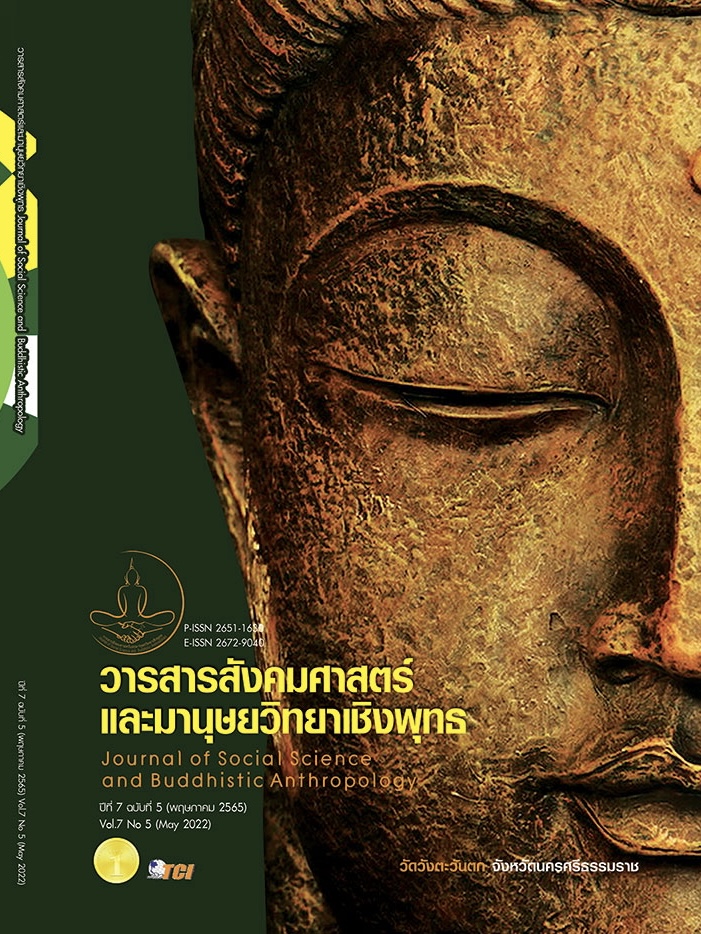THE INFLUENCE OF TAX PLANNING ON EARNINGS MANAGEMENT OF THAI STOCK EXCHANGE
Keywords:
Tax Planning, Earnings Management, The Stock Exchange MAIAbstract
The Objectives of this research article were to 1) study the level of tax planning and earning Management of Thai stock exchange, and 2) study influence of tax planning and earning Management of Thai stock exchange. The quantitative research method was used questionnaire by specific selecting so the sample group was the representative from company listed on the stock exchange, MAI, industry from 2015 to 2017, Which were 1) agriculture and food industry, 2) consumer goods, 3) industrial products, 4) property and construction, 5) resource, 6) service, and 7) technology for all 901 companies. The data were analyzed by using mean, standard deviation, maximum, minimum, multiple regression analysis. The research was found that: 1) the tax planning level of a listed company was tax planning that effective tax rate (ETR) ( = 0.228, S.D. = 2.236) and tax ratio method to cash flows from operating activities (TAX/CFO) (
= 0.021, S.D. = 2.690), tend to fluctuate, tax planning method of tax ratio to total assets (TAX/Asset) (
= 0.013, S.D. = 0.014). The average trend was decreasing every year and earnings management (EM) tended to fluctuate (
= -0.024, S.D. = 0.192) and 2) The influence of tax planning for tax planning and earning Management of listed companies on the stock exchange was tax planning method of tax ratio to cash flows from operating activities to earnings management. The negative relation was -1.959, F-Value (sig) 1.919 and Adjusted R Square 0.009. The property and construction group had positive earnings management 2.838, F-Value (sig) 1.919 and Adjusted R Square was 0.009 Significant 0.01.
References
จริยา รอดจันทร์. (2563). การสร้างภาพลักษณ์ขององค์กรธุรกิจ ISO 14001 โดยใช้การบัญชี สิ่งแวดล้อม: กรณีศึกษากลุ่มอุตสาหกรรมภาคเหนือตอนล่าง. วารสารมหาจุฬานาครทรรศน์, 7(12), 142-159.
ตลาดหลักทรัพย์แห่งประเทศไทย. (2562). รายชื่อบริษัท ที่จดทะเบียนในตลาดหลักทรัพย์แห่งประเทศไทย. เรียกใช้เมื่อ 1 ธันวาคม 2562 จาก https://www.set.or.th.
ตลาดหลักทรัพย์แห่งประเทศไทย. (2563). วิเคราะห์ปัจจัยพื้นฐาน. เรียกใช้เมื่อ 12 ธันวาคม 2563 จาก https://www.set.or.th /education/th/begin/stock_content04.pdf
ทิพย์ธัญญา หริณานนท์. (2560). อิทธิพลของการกำกับดูแลกิจการที่มีต่อการจัดการกำไร และมูลค่าเพิ่งเชิงเศรษฐศาสตร์: กรณีศึกษาบริษัทจดทะเบียนในตลาดหลักทรัพย์แห่งประเทศไทย กลุ่ม SET 100. ใน วิทยานิพนธ์บัญชีมหาบัณฑิต สาขาวิชาการบัญชี. มหาวิทยาลัยสงขลานครินทร์.
บุญชม ศรีสะอาด. (2556). วิธีการทางสถิติสำหรับการวิจัย. (เล่มที่ 2). กรุงเทพมหานคร: สุวีริยาการพิมพ์.
ไพริน ใจทัด. (2555). ความสัมพันธ์ระหว่างการจัดการกำไรและการกำกับดูแล. ใน วิทยานิพนธ์บริหารธุรกิจมหาบัณฑิต สาขาบริหารธุรกิจ. มหาวิทยาลัยเกษตรศาสตร์.
รสนา โชติสุวรรณ. (2562). ความสัมพันธ์ระหว่างการวางแผนภาษีกับราคาหุ้นสามัญของบริษัทจดทะเบียน ในตลาดหลักทรัพย์แห่งประเทศไทย. RMUTT Global Business and Economics Review, 14(1). 23-36.
สัตยา ตันจันทร์พงศ์. (2557). อิทธิพลของการกำกับดูแลกิจการ การบริหารกำไรและการวางแผนภาษีที่มีผลต่อการดำเนินงานของบริษัทจดทะเบียนในตลาดหลักทรัพย์แห่งประเทศไทย. วิทยานิพนธ์บริหารธุรกิจมหาบัณฑิต สาขาวิชาบริหารธุรกิจ, มหาวิทยาลัยนเรศวร.
สำนักงานคณะกรรมการนโยบายรัฐวิสาหกิจ. (2557). กฎหมายในการกำกับรัฐวิสาหกิจ. กรุงเทพมหานคร: สำนักงานคณะกรรมการนโยบายรัฐวิสาหกิจ.
Chen, et al. (2007). Corporate Governance and Earnings Management: The Implications of Corporate Governance Best-Practice Principles for Taiwanese Listed Companies. Journal of Contemporary Accounting & Economics, 3(2), 73-105.
Cronbach, L. J. (1990). Essentials of psychological testing. (5th ed.). New York: Harper Collins. Publishers.
Erickson, M., et al. (2004). How much will firms pay for earnings that do not exist? Evidence of taxes paid on allegedly fraudulent earnings. The Accounting Review, 79(2), 387-408.
Frank, et al. (2021). Tax Reporting Aggressiveness and Its Relation to Aggressive Financial Reporting. Retrieved April 20, 2021, from http://papers.ssrn.com/ sol3/papers. cfm?abstract_id=647604
Henry, D. (2010). Agency costs, ownership structure and corporate governance compliance: A private contracting perspective. Pacifi c-Basin Finance Journal, 18(1), 24-46.
Hope, O. K. et al. (2021). Tax Avoidance and Geographic Earnings Disclosure. Retrieved may 14, 2021, from http://sites.som.yale.edu/ accountingconference/ fi les/2011/10/Hope_Paper-2.pdf. 14/5/2021
Ifada, L. M., & Wulandari, N. (2015). The effect of deferred tax and tax planning toward earnings management practice: An empirical study on non manufacturing companies listed in Indonesia stock exchange in the period of 2008-2012. International Journal of Organizational Innovation, 8(1), 352-380.
Krejcie, R. V. & Morgan, D. W. (1970). Determining Sample Size for Research Activities. Educational and Psychological Measurement, 30(3), 607-610.
Lanis, R. & Richardson, G. (2011). The effect of board of director composition on corporate tax aggressiveness. Journal Account Public Policy, 30(2), 50-70.
Likert, R. (1967). The Method of Constructing and Attitude Scale. In Reading in Fishbeic, M (Ed.), Attitude Theory and Measurement (pp. 90-95). New York: Wiley & Son.
Liu, Q. & Lu, Z. (2007). Corporate governance and earning management in the Chinese listed companies: A tunneling perspective. Journal of Corporate Finance, 13(2), 881-906.
Rego, S.O. & Wilson, R. (2021). Executive Compensation, Equity Risk Incentives, and Corporate Tax Aggressiveness. Retrieved April 14, 2021, from http://papers.ssrn. com/sol3/ papers. cfm?abstract_id=1337207
Wysocki, P. D. (2021). Earnings Management, Tax Compliance, and Institution Factors: A Discussion of Haw, et al. Retrieved April 14, 2021, from http://web.mit.edu/wysockip/
Downloads
Published
How to Cite
Issue
Section
License
Copyright (c) 2022 Journal of Social Science and Buddhistic Anthropology

This work is licensed under a Creative Commons Attribution-NonCommercial-NoDerivatives 4.0 International License.









